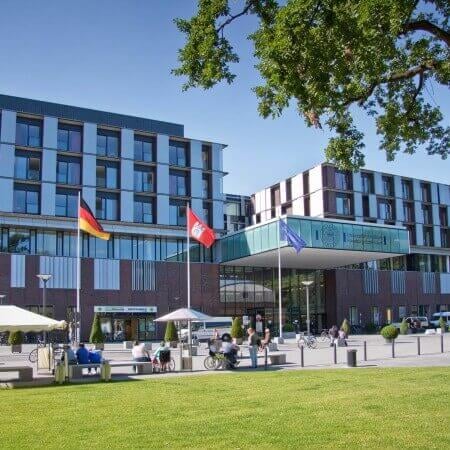Non-Hodgkin lymphoma is a large group of tumors originating from T lymphocytes or B lymphocytes. Most neoplasms initially develop in the lymph nodes, which can then spread to soft tissues, internal organs, bone marrow, and the central nervous system. Lymphomas can be indolent (smoldering) and aggressive. These neoplasms develop more often in adults and less often in children.
Oncologists abroad effectively treat any non-Hodgkin lymphomas, and most patients completely get rid of this disease. Drug therapy is usually sufficient to combat this tumor successfully. Sometimes, doctors resort to radiation therapy, CAR T-cell therapy, or a stem cell transplant.
Content
- Chemotherapy
- Immunotherapy
- Targeted therapy
- Other types of drug therapy
- Radiation therapy
- Stem cell transplant
- Surgical treatment
- Where to undergo lymphoma treatment?
Chemotherapy
Chemotherapy is considered the main method for the treatment of non-Hodgkin lymphoma. A treatment regimen depends on the type of the tumor and a patient's age. This may include alkylating agents, corticosteroids, platinum-based drugs, purine analogues, antimetabolites, and other agents. The CHOP or CVP regimen is used for many neoplasms. Chemotherapy is often complemented by targeted therapy and immunotherapy.
The advantage of chemotherapy is that this acts immediately on all tumor foci in the body, so it works well at all stages. Most types of lymphoma are sensitive to cytostatics. A successful therapy leads to a complete cure of the disease.
Sometimes lymphoma spreads to the central nervous system. Most drugs do not penetrate it from the blood due to the blood-brain barrier. In such cases, doctors use intrathecal chemotherapy: drugs are injected into the cerebrospinal fluid through a lumbar puncture.
Immunotherapy
Doctors often use immunotherapy in addition to chemotherapy for non-Hodgkin lymphomas. This treatment can be carried out in different versions:
Monoclonal antibodies can target the CD20, CD19, CD52, CD30, and CD79b proteins, depending on the type of the tumor. Chemotherapy agents can sometimes be attached to monoclonal antibodies. As a result, they are delivered directly to the cancer cells. Such drugs are called antibody-drug conjugates. They are usually used as a second-line therapy when "regular" monoclonal antibodies have already been tried.
Immune checkpoint inhibitors are used much less often. These can be applied only for certain types of non-Hodgkin lymphoma, such as primary mediastinal large B-cell lymphoma that has recurred after chemotherapy. The mechanism of action of these drugs is to block molecules that allow the tumor to evade the immune response.
Immunomodulators are usually used for lymphoma in cases where other treatment methods have already been tried and failed. Drugs are prescribed in pills. They stimulate the immune response, allowing a patient's body to fight lymphoma more successfully. Medicines from this group are used with caution in pregnant women because there is a risk of developing congenital malformations in the fetus.
CAR T-cell therapy is an innovative treatment method, the essence of which is that doctors obtain immune cells from the patient's blood, alter them and inject them back into the body. The modified cells attack the tumor. Four drugs have already been approved in Europe and the US for CAR T-cell therapy, which work well for different types of lymphoma: large B-cell, diffuse B-cell, follicular, and mantle cell. Due to the high cost of treatment, the technique is used in the most severe cases when other therapeutic methods cannot cope with the oncological disease.
Targeted therapy
Unlike chemotherapy, which affects all cells in the body, targeted therapy targets particular molecular targets detected exclusively in lymphoma cells. Therefore, this drug therapy is more selective about the tumor. At the same time, this requires a personalized approach to prescribing treatment. The therapy is selected based on the molecular diagnosis of cancer and is usually used as a "fallback" treatment option if there is no response to chemotherapy or the tumor recurs after its initial treatment.
Doctors prescribe the following inhibitors to their patients:
- proteasome;
- histone deacetylase;
- Bruton's tyrosine kinase (BTK);
- phosphoinositide 3-kinases (PI3K);
- EZH2;
- nuclear export inhibitors.
Hospitals in developed countries offer the latest drugs, which allow doctors to get good therapeutic results even in patients with advanced oncologic diseases.
Other types of drug therapy
For some lymphomas, other drug therapy options can also be used.
For example, MALT lymphoma is caused by Helicobacter pylori infection. Antibiotics are required to suppress it. In the case of gastric lymphomas, patients also receive proton pump inhibitors to reduce the production of hydrochloric acid.
Splenic marginal zone B-cell lymphoma can sometimes be associated with viral hepatitis C. Its destruction by antiviral drugs helps to reduce the tumor size or even cure cancer completely.
Lymphomas often affect not only the lymph nodes, but also the bone marrow. Such patients have a decreased production of blood cells, weak immunity, and blood clotting disorders are possible as well. To prevent complications and to cope with complications that have already developed, doctors use antibiotics, antiviral agents, intravenous immunoglobulin, erythrocyte or platelet mass transfusions.
Radiation therapy
Radiation therapy for lymphoma can be used in the following cases:
- as an independent treatment method for stages 1-2;
- for aggressive lymphomas, along with chemotherapy;
- before a stem cell transplant (total body irradiation sometimes supplements high-dose chemotherapy);
- for relieving symptoms caused by compression of the internal organs, soft tissues, nerves, brain and spinal cord.
Stem cell transplant
In the most severe and advanced cases, lymphoma can be treated with a stem cell transplant. This procedure is usually conducted in children or young patients, but is rarely used for older people.
Stem cells provide hematopoiesis. All other blood cells develop from them: erythrocytes, platelets, and immune cells, namely leukocytes. A stem cell transplant can be autologous or allogeneic, depending on whether the cells are transplanted from a patient or from a donor.
When dealing with lymphoma treatment, autologous cells are more commonly used. However, this is only possible if the lymphoma has not spread to the bone marrow. The essence of this procedure is that stem cells are harvested from a patient and frozen, followed by a course of high-dose chemotherapy, sometimes combined with radiation therapy. High doses of drugs completely destroy the lymphoma, but they also irreversibly suppress the bone marrow. The previously harvested stem cells are injected back into the body after a while to restore it.
If the lymphoma has spread to the bone marrow, an autologous transplant is unlikely to eliminate cancer completely. This is because the biomaterial taken from a patient is highly likely to contain cancer cells. In the future, they will grow, and the lymphoma is highly likely to recur after a transplant procedure. Therefore, doctors resort to an allogeneic stem cell transplant in such cases. Donor bone marrow definitely does not contain any cancer cells. In addition, this transplant cannot activate "graft-versus-tumor" responses, which provides an additional therapeutic effect due to immune mechanisms.
Surgical treatment
Surgery for lymphoma is rare. If this treatment becomes an option of choice, this is an auxiliary method, but not the main one.
Sometimes surgery can be performed at an early stage of thyroid or gastric lymphoma. However, radiation therapy is the preferred option for dealing with these tumors. Surgery can be considered if radiation therapy is contraindicated (for example, a patient has already received radiation therapy before), or if cancer has to be removed immediately (for example, it compresses the neck and prevents breathing).
Low red blood cell levels become a problem for many patients. To reduce their destruction, doctors may perform a splenectomy, an operation to remove the spleen.
Where to undergo lymphoma treatment?
Non-Hodgkin lymphoma can be cured in most cases if you receive medical care in a good clinic abroad. You are welcome to use the Booking Health service to make your treatment appointment in one of the developed countries. There are a few reasons for you to undergo your treatment abroad:
- you will be treated by reputable doctors in modern and well-equipped Cancer Centers;
- high-precision diagnostics will determine the type and the subtype of lymphoma to select a personalized treatment;
- specialists abroad use the latest drugs, including not only chemotherapy, but also targeted therapy, monoclonal antibodies, antibody-drug conjugates, immune checkpoint inhibitors, etc.;
- availability of complex high-tech procedures, such as a stem cell transplant and CAR T-cell therapy, which help doctors to cure lymphomas even at the advanced stage;
- doctors use the latest methods of radiation therapy, which treat the tumor while minimally affecting the surrounding tissues.
With the Booking Health service, you can find out the cost of treatment and select a clinic that suits your budget. Our company's specialists will advise you and help you to make the best choice. You will receive insurance that will protect you against unexpected medical expenses. The Booking Health specialists will fully arrange your trip abroad, and you can focus on restoring your health.
Authors:
The article was edited by medical experts, board-certified doctors Dr. Nadezhda Ivanisova and Dr. Sergey Pashchenko. For the treatment of the conditions referred to in the article, you must consult a doctor; the information in the article is not intended for self-medication!
Sources:
Cancer Support Community
American Cancer Society



















